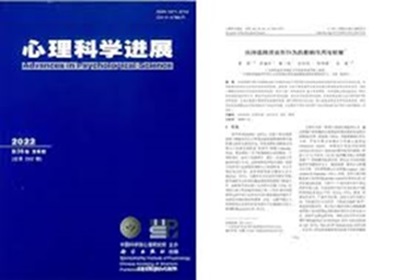The mechanism of “cool”/“hot” executive function deficit acting on the core symptoms of ADHD children
引用次数: 0
Abstract
: Attention-deficit/hyperactivity disorder (ADHD) is a persistent neurodevelopmental disorder characterized by inattention and/or hyperactivity-impulsivity, which is closely related to the executive function deficits resulting from the dysplastic of prefrontal cortex. Based on the neuro-cognitive-behavioral developmental path, it is proposed that executive function deficits may be the pathogenesis of the core symptoms of ADHD at the cognitive level, among which the "cool" one related with the dorsal prefrontal cortex might be the dominant factor affecting inattention, and the “hot” one linked to the ventromedial prefrontal cortex could play the main role in the manifestation of hyperactivity-impulsivity. On the one hand, deficits in "cool" executive function mainly result in failures in working memory representation, lack of inhibitory control, and difficulties in cognitive flexibility, and further lead to limitations in attention maintenance, selection, and switching. On the other hand, deficits in "hot" executive function bring problems like delay aversion, reward abnormality and motivation disorders, which make one fail to inhibit behavior and more likely to make impulsive decisions, thereby displaying more symptoms of hyperactivity-impulsivity. Future studies are expected to examine and improve theoretical models of “hot” and “cold” executive function deficits affecting the core symptoms of ADHD, and provide more empirical evidence at the cognitive neural level. Meanwhile, future studies need to examine the mechanism mentioned above in ecological backgrounds, and further develop intervention projects with personalization, precision and long-acting to alleviate the core symptoms of ADHD based on executive function.“冷”/“热”执行功能缺陷作用于ADHD儿童核心症状的机制
注意缺陷多动障碍(Attention-deficit hyperactivity disorder, ADHD)是一种以注意力不集中和/或多动冲动为特征的持续性神经发育障碍,与前额皮质发育不良导致的执行功能缺陷密切相关。基于神经-认知-行为发展路径,提出执行功能缺陷可能是ADHD核心症状认知层面的发病机制,其中与背侧前额叶皮质相关的“冷”可能是影响注意力不集中的主导因素,与腹内侧前额叶皮质相关的“热”可能在多动-冲动的表现中起主要作用。一方面,“冷静”执行功能的缺陷主要导致工作记忆表征失败、抑制控制缺失、认知灵活性困难,进而导致注意维持、选择和转换的限制。另一方面,“热”执行功能的缺陷会带来延迟厌恶、奖励异常、动机障碍等问题,使人无法抑制行为,更容易做出冲动的决定,从而表现出更多的多动-冲动症状。未来的研究有望检验和完善“热”和“冷”执行功能缺陷影响ADHD核心症状的理论模型,并在认知神经层面提供更多的经验证据。同时,未来的研究需要在生态背景下检验上述机制,并进一步开发基于执行功能的个性化、精准性和长效性干预项目,以缓解ADHD的核心症状。
本文章由计算机程序翻译,如有差异,请以英文原文为准。
求助全文
约1分钟内获得全文
求助全文

 求助内容:
求助内容: 应助结果提醒方式:
应助结果提醒方式:


